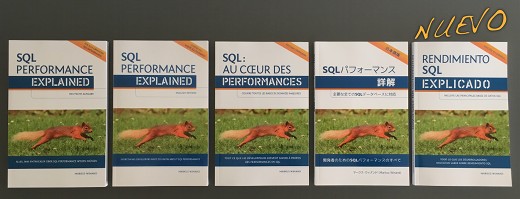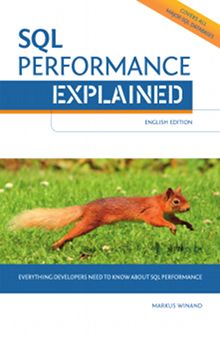The Spanish translation of my book SQL Performance Explained has just been published. It’s the fifth language so far … now there’s a German, English, French, Japanese and Spanish version of the book!

You can buy it directly from the book website (PDF or paperback), and some it’s also available through some European Amazon stores (paperback only). The prices are the same as for the other languages: €9.95 for the PDF, €29.95 for the hard copy, €34.95 for PDF+paperback. If you order from the book website, you get free shipping (worldwide!)
As for the other languages, all of the Spanish content is available for free at https://use-the-index-luke.com/es/.
As part of this translation effort, we (the translators and myself) also updated the content to the latest database releases: Db2 11.1, MySQL 5.7 (carefully phrased so it stays correct for 8.0), Oracle 12c R2, and PostgreSQL 10.
As the book focuses on concepts, only a few changes were needed. Here are some of the more important ones:
MySQL 5.7 supports function-based indexes via generated columns.
The explanations for this were already in the book because SQL Server uses the same approach to function-based indexes — so we just had to mention that this works in MySQL 5.7 too.
SQL Server 2016 increased the maximum key length for indexes.
Index keys were generally limited to 16 columns with 900 bytes in total. Now it’s 32 columns. Non-clustered indexes can now have up to 1700 bytes.
Oracle 12c supports
fetch first … rows onlyThis was also a trivial change because the PostgreSQL examples were already using
fetch first … rows only.
No big deal, right? If you own a hard copy, don’t throw it away yet ;) If you have the PDF edition, you can download an updated version here (link works for all languages).
A BIG THANK YOU
I would like to send a BIG THANK YOU to the translators and reviewers! Thanks Guillaume and thanks Hayato for the continued efforts. Special thanks to Martin, the translator of the Spanish edition, and Álvaro, the technical reviewer and mastermind behind ToroDB — Bringing MongoDB to SQL.
Also Updated: The 3-Minute Quiz!
In unrelated news: I’ve also updated the very popular 3-Minute SQL Indexing Quiz: Can you spot the five most common SQL indexing mistakes?
60% of the participants actually fail the quiz — it can’t be that hard, can it? Don’t forget to challenge your colleagues ;)

